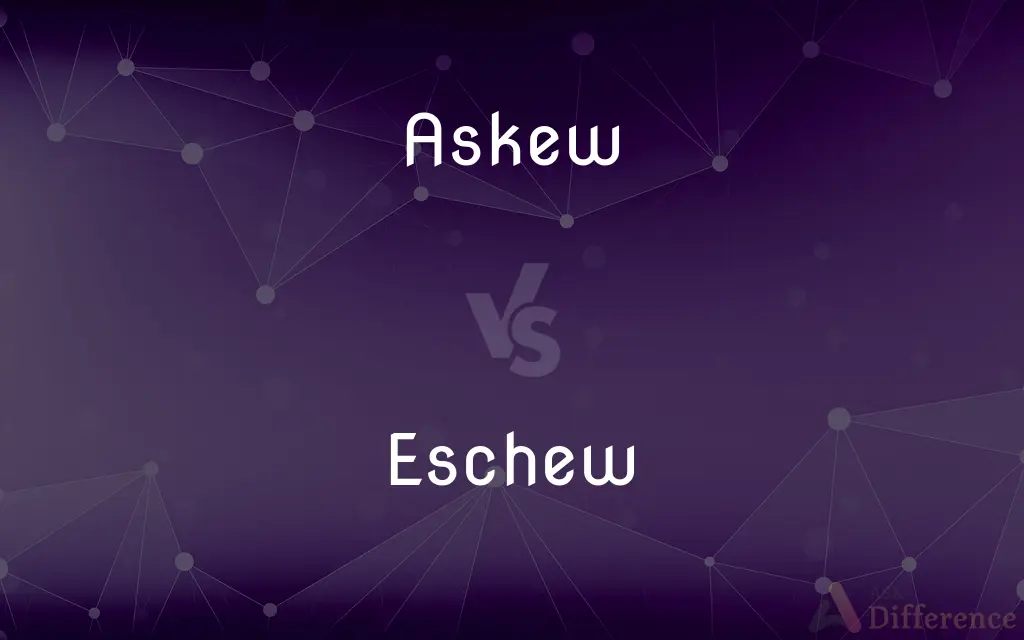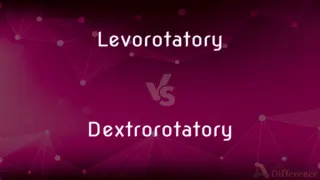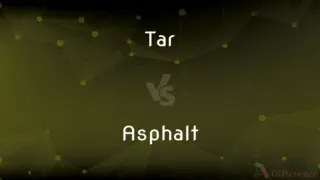Askew vs. Eschew — What's the Difference?
Edited by Tayyaba Rehman — By Urooj Arif — Updated on April 26, 2024
Askew means not in a straight or level position, while eschew signifies deliberately avoiding or abstaining from something.

Difference Between Askew and Eschew
Table of Contents
ADVERTISEMENT
Key Differences
Askew describes a physical misalignment or something that is not straight; for instance, a picture hanging askew on a wall. Whereas eschew is used to denote the intentional avoidance of a particular behavior, practice, or task.
When something is askew, it often implies a visual or perceptual error, like a tie or glasses positioned crookedly. On the other hand, eschew involves a conscious decision to steer clear of certain actions or practices, often for moral, practical, or personal reasons.
Askew can also suggest a sense of disorder or chaos in appearance, which can affect the aesthetics or functionality of objects or scenes. Conversely, eschew reflects a choice that aligns with one's values or goals, often leading to a sense of discipline or ethical integrity.
The use of askew typically pertains to physical objects and their arrangement. In contrast, eschew applies more broadly to behaviors, habits, and sometimes even social or dietary preferences.
Both terms carry a notion of deviation; askew from the norm of alignment, and eschew from conventional or expected patterns of behavior. However, the contexts and implications of their use are distinctly different.
ADVERTISEMENT
Comparison Chart
Definition
Not straight; tilted or crooked
To deliberately avoid or abstain
Part of Speech
Adjective, adverb
Verb
Usage Context
Visual and spatial alignment
Behavioral and decision-making choices
Implication
Error or irregularity in position
Moral or practical choice
Example of Use
"The frame is hanging askew."
"He chooses to eschew alcohol."
Compare with Definitions
Askew
Disarranged; not in proper order.
The books on the shelf were all askew.
Eschew
To deliberately avoid.
She eschews meat for ethical reasons.
Askew
With a lack of order.
His notes were scattered askew across the desk.
Eschew
To abstain from.
They eschew smoking and other bad habits.
Askew
Awry in position.
His hat sat askew after the playful scuffle.
Eschew
To shun or steer clear of.
He eschewed formal events where he had to speak publicly.
Askew
In a tilted position.
The sign stood askew, battered by the wind.
Eschew
To reject or keep away from.
As a policy, the company eschews political contributions.
Askew
Crookedly; not aligned.
The mirror was hung askew, giving the room an unsettling feel.
Eschew
To refrain from engaging in.
She eschews using plastic to help the environment.
Askew
Askew is an English surname.
Eschew
Deliberately avoid using; abstain from
He appealed to the crowd to eschew violence
Askew
Not in a straight or level position
Her hat was slightly askew
Eschew
To avoid using, accepting, participating in, or partaking of
“Italian tends to eschew the sort of polite euphemisms in which English glories” (David Leavitt).
Askew
To one side or out of proper alignment; awry
Rugs lying askew.
Eschew
To refrain from (doing something).
Askew
Turned or twisted to one side.
Eschew
To avoid; to shun, to shy away from.
Askew
(figuratively) Untoward, unfavourable.
Eschew
To shun; to avoid, as something wrong, or from a feeling of distaste; to keep one's self clear of.
They must not only eschew evil, but do good.
Askew
Tilted to one side.
He wore his hat askew
Eschew
To escape from; to avoid.
He who obeys, destruction shall eschew.
Askew
Awry; askance; asquint; oblique or obliquely; - sometimes indicating scorn, or contempt, or entry.
Eschew
Avoid and stay away from deliberately; stay clear of
Askew
Turned or twisted toward one side;
A...youth with a gorgeous red necktie all awry
His wig was, as the British say, skew-whiff
Askew
Turned or twisted to one side;
Rugs lying askew
With his necktie twisted awry
Common Curiosities
What does eschew mean?
Eschew means to deliberately avoid or abstain from a particular behavior, practice, or habit.
Why might someone eschew something?
Someone might eschew something for moral, health-related, or personal reasons, choosing to avoid what they consider harmful or undesirable.
What is the opposite of askew?
The opposite of askew is aligned, straight, or orderly.
What does it mean when something is askew?
When something is askew, it is not in a straight line or proper alignment; it appears crooked or tilted.
Can eschew be used in a positive context?
Yes, eschewing can be viewed positively when it involves avoiding negative behaviors or harmful substances.
Is askew ever used as a verb?
Askew is primarily used as an adjective or adverb, not commonly as a verb.
Can askew be used in a figurative sense?
Yes, askew can also describe situations or plans that have gone awry, not just physical misalignment.
How do you correct something that is askew?
Correcting something that is askew involves realigning it to the proper position or straightening it.
Can businesses eschew practices?
Yes, businesses can eschew practices they find unethical or harmful, such as avoiding sweatshop labor.
What is an example of eschewing something for ethical reasons?
An example would be someone eschewing fast fashion brands to protest against poor labor practices.
Share Your Discovery

Previous Comparison
Levorotatory vs. Dextrorotatory
Next Comparison
Tar vs. AsphaltAuthor Spotlight
Written by
Urooj ArifUrooj is a skilled content writer at Ask Difference, known for her exceptional ability to simplify complex topics into engaging and informative content. With a passion for research and a flair for clear, concise writing, she consistently delivers articles that resonate with our diverse audience.
Edited by
Tayyaba RehmanTayyaba Rehman is a distinguished writer, currently serving as a primary contributor to askdifference.com. As a researcher in semantics and etymology, Tayyaba's passion for the complexity of languages and their distinctions has found a perfect home on the platform. Tayyaba delves into the intricacies of language, distinguishing between commonly confused words and phrases, thereby providing clarity for readers worldwide.
















































